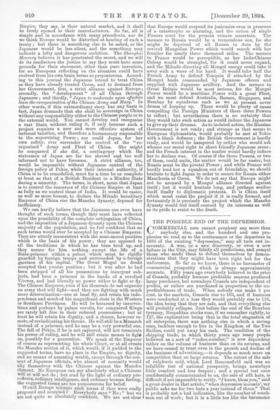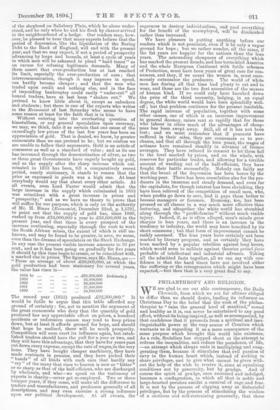THE POSSIBLE END OF THE DEPRESSION.
COMMERCLAI men cannot prophesy any more than anybody else, and the hundred and one pro- phecies we read as to the continuance or the departure in 1896 of the existing "depression," may all turn out in- accurate. A war, or a new discovery, or even a new failure in the City, may falsify all predictions, and compel those who made them to defend themselves by demon- strations that they might have been right but for the unforeseen. So far as we know, there is no barometer of commercial prosperity which is always approximately accurate. Fifty years ago everybody believed in the price of Consols, probably because profitable seasons produced large purchases, but nowadays Consols are independent of profits, or rather are purchased in proportion to the un- profitableness of trade. When nobody can make 5 per cent. in the markets, Consols rise to 103, and if business were conducted at a loss they would probably rise to 110, the idea being that they are safe, and that everything else will probably collapse. Just before the end of the Bourbon tyranny, Neapolitan stocks rose, if we remember rightly, to 127, the explanation being that in the total stagnation of all enterprise, there was nothing else in which a saving man, luckless enough to live in the Kingdom of the Two Sicilies, could put away his cash. The condition of the shipping trade, in which thirty years ago many people believed as a sort of "index-number," is now dependent rather on the volume of business than on its returns, and we he.ve.ceased to trust even in the growth and decline of the business of advertising,—it depends so much more on competition than on large returns. The extent of the sale of sulphuric acid, which Lord. Beaconsfield. said was an infallible test of national prosperity, brings nowadays little comfort and less despair ; and a special test once confidentially communicated to us, the sale of silk hats, is difficult if not impossible to verify. "I know, bless you," said a great dealer in that article," when depression is comin', my public asks me for two hats a year instead of three." That is probably not a bad, indication, like the number of coach- men out of work; but it is a little too like the barometer of the shepherd on Salisbury Plain, which he alone under- stood, and he only when he and his flock by chance arrived in the neighbourhood of a hedge. Our readers may, how- ever, be pleased to hear that many experts believe that the period of depression, like the liquidation of the Baring Debt to the Bank of England, will end with the present year, and that we may expect, if not a period of prosperity advancing by leaps and bounds, at least a cycle of years in which men will be ashamed to plead "hard times" as an excuse for refusing legitimate demands. Many of them assert that over-production has at last reached its limit, especially the over-production of corn ; that intercommunication, though it may improve in speed, can hardly become cheaper ; and that the men who traded upon credit and. nothing else, and in the face of impending bankruptcy could easily "under-cut" all honest traders, have at last been "shaken out." We pretend to know little about it, except as onlookers and students ; but there is one of the experts who writes in the Economist of last Saturday who seems to have some reason at least for the faith that is in him.
Without entering into the everlasting question of bimetallism, or any general speculation upon currency, we may, we think, take it as certain that one cause of the exceedingly low prices of the last few years has been an appreciation of gold. That is denied, we know, by greater economists than we can pretend to be ; but we confess we are unable to follow their arguments. Gold is an article of commerce as well as a standard of value ; and as its use has increased through the demonetisation of silver, as two or three great Governments have eagerly bought up gold, and as the supply after the sharp increase which cul- minated. in 1853 has been, till a comparatively recent period, nearly stationary, it stands to reason that the price as expressed in goods was a high one. At least everybody would say that about every other article. At all events, even Lord Rorer would admit that the large increase in the supply which culminated in 1853 was coincident with a great increase in prices and " prosperity; " and as we have no theory to prove that will suffice for our purpose, which is only on the authority of Mr. H. Binns (Economist, December 22nd, p. 1,578), to point out that the supply of gold has, since 1890, rushed up from £24,000,000 a year to £36,000,000 in the present year, and that there is every prospect of the increase continuing, especially through the rush to work the South African mines, the extent of which is still un- known, and may be found to be greater, in area, we mean, even than the dreams of speculators on the Stock Exchange. In any case the present visible increase amounts to 33 per cent., and as it has been going on gradually for five years it should 17 this time begin to create, or be coincident with, a marked rise in prices. The figures, says Mr. Binns, are :— "Prom an average of about 420,000,000, at which the gold production had been stationary for several years, the value has risen in- 1894 tO
4116
• ••
... X36,200,000 (estimate.) 1893 Gt. • .6
•••
32,400,000
1892
11.6 30,480,000
1891
•••
... 27,300,000
1890
166 966 ... 24,700,000
The record year (1853) produced £32,300,000." It would be futile to argue that this table afforded any ground of certainty ; for, not to mention the argument of the great economists who deny that the quantity of gold produced has any appreciable effect on prices, a hundred accidents or unforeseen causes may tend to keep prices down, but at least it affords ground for hope, and should that hope be realised, there will be much prosperity. Competition will soon exert its influence again, but estab- lished traders should have the pull for a year or two, and they will have this advantage, that they have for years past cut down every expense, except the rate of wages, to the very bone. They have bought cheaper machinery, they have made contracts in pennies, and they have picked their " hands " of all kinds with such care that hardly any " cry " of the many that rises to heaven is now so "bitter' or so sharp as that of the half-efficient, who are discharged by wholesale, and who'—we speak on the testimony of experts in charity—never get re-employed. Two or three bumper years, if they come, will make all the difference to traders and manufacturers, and producers generally of all descriptions, and may even exercise a strong influence upon our political development. At all events, the eagerness to destroy individualism, and pool everything for the benefit of the unemployed, will be diminished rather than increased.
We have pleasure in putting anything before our readers which is not pessimist, even if it be only a vague ground for hope ; but we rather wonder, all the same, if the fat years are happier for the nations than the lean years. The astounding cheapness of everything which has marked the present decade, and has tormented America and the whole European Continent with futile schemes of Protection, must have been years of great ease for con- sumers, and they, if we count the women in, must enor- mously outnumber the producers. The world of white men has during all that time had plenty to eat and to wear, and those are the two first necessities of the masses of human kind. If we could only have knocked down the price of the third necessity, lodging, in an equal degree, the white world would have been splendidly well- off ; but that problem continues for the present insoluble. The rapid increase of population, together with some other causes, one of which is an immense improvement in general decency, raises rent so rapidly that for those who labour in cities much of the advantages of cheap- ness has been swept away. Still, all of it has not been lost ; and we must remember that if peasants have suffered in their sales, they are consumers as to pur- chases, and that all through the lean years, the wages of artisans have remained steadily in advance of former averages. They have refused to consent to let them fall to the level marked by prices, and on the whole, with reserves for particular trades, and allowing for a terrible amount of weeding out of the half-efficient, they have fought their battle successfully. Nobody can fairly say that the brunt of the depression has been borne by the working poor. There has been consolation also for the pro- ducers in the immense and steady demand, and even for the capitalists, for though interest has been shrinking, they have been relieved of the competition of small men, who, when profits go down to zero, find it pays them better to become managers or foremen. Economy, too has been pressed on all classes in a way much more effective than lecturing, and altogether the white world has stumbled along through the "profit-famine" without much visible injury. Indeed, if, as is often alleged, men's minds grow sharper in lean years, and there is an increase in the tendency to industry, the world may have benefited by its short commons ; but that form of improvement cannot be rashly assumed. The lean years have certainly not been marked by literary progress, and as certainly they have been marked by a popular rebellion against long hours, which would seem to militate against theories privid facie probable of intellectual and industrial advance. Taking all the admitted facts together, all we can say with con- fidence is that the hard times have not involved either the suffering or the retrogression which might have been expected,—but then that is a very great deal to say.



































 Previous page
Previous page